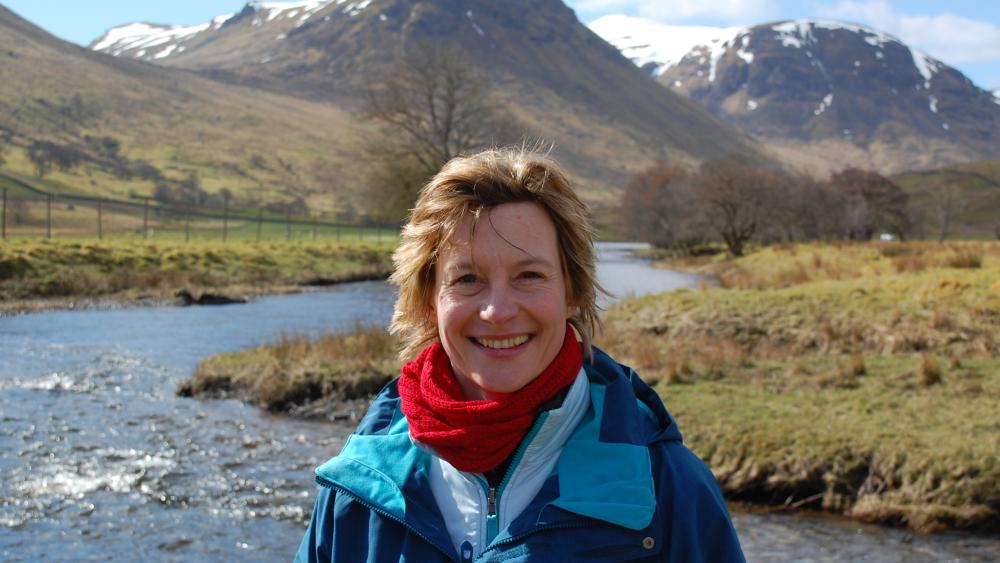
Dörthe Tetzlaff is head of IGB's Department 1: Ecohydrology, and is leading the Research Group Landscape Ecohydrology. | Photo: private
What is the focus of your research?
The fundamental objective of my research is to better understand the temporal and spatial variabilities in the ecohydrological “behaviour” of catchment areas. I analyse the physical processes that cause runoff into freshwaters to find out how these processes influence the hydrochemistry and hydroecology of freshwaters. One of the key questions is: “What happens when it rains?” In my research, I integrate empirical and modelling approaches to quantify the interactions between physical and ecological processes and to assess sensitivities of catchment areas in light of environmental changes.
Why do you find your area of research so fascinating?
I love nature and I love water. My area of research always gives me a wonderful “excuse” to spend a lot of time in and with both of these. I find it fascinating how our complex natural world can be described by relatively “simple” laws of physics, but also how important it is to know the study area and to have actually experienced it. Such an understanding then forms the basis for the sustainable management of our water resources.
What brought you to IGB in Berlin?
The interdisciplinarity and opportunities IGB offers, including its central location in the Berlin scientific milieu. Its location in the heart of Germany and Europe offers unique opportunities. IGB is internationally renowned for its freshwater research, and I was delighted to be given the opportunity to become a member of this interdisciplinary team.
What attracted your attention first, (second, third) at IGB?
The friendly and collegial atmosphere struck me right away. You just love going to work at IGB – which is wonderful!
There must be things you miss when you think of Scotland, though, aren’t there?
What I miss the most are the beautiful river landscapes and the lakes, the possibility to see wild salmon jumping in the rivers, the blue sky (when the sun is shining), the clear air, the mountains, the light green beech trees in spring, the purple flowering heathlands in summer and the orange-yellow birches in autumn – and the emptiness of the landscape. I am aware that this probably sounds excessively romantic, but Scotland is a beautiful country – a dream for any natural or environmental scientist.
What makes research such an exciting occupational field?
Research is incredibly diverse and exciting for curious people who simply cannot (and don’t want to) stop exploring and who always want to know something new. It’s fun to learn how nature “works”. You usually discover something totally different than you had expected. In my view, every measurement is a good measurement and all data is interesting data.
What constitutes a good research and working environment?
Opportunities, trust and reliability: opportunities to implement ideas and visions. Trust in colleagues and cooperation partners. Reliability – knowing that you can unthinkingly rely on one another without a second thought. This is the basis for good research that is enjoyable to do. And the things we enjoy doing produce better results. Is there anything more enjoyable than looking forward to project meetings, if it means you see your friends again and learning more about our environment, enabling us to better manage our environment and freshwaters – and this is called “work”?
What do you think – what are the current challenges research policy has to face?
For 15 years, I worked and conducted research in a country where financial support for research was limited. Germany therefore seems to be a “land of milk and honey for science” for me. However, good financial support and equipment are not guaranteed on a long-term basis, which poses risks. In addition, I think too much bureaucracy acts as a barrier: innovative, ground-breaking research often needs quick and prompt actions and reactions.
Which question by students do you like to answer the most?
I have mainly worked in geosciences so far. In this area, there is still a considerable imbalance in senior positions regarding gender distribution. The majority of female PhD students (and female post-docs) do not have female supervisors or superiors. I try to encourage these young women to ask questions they usually would not or cannot ask. For example, I am often asked: “Is it possible to strike a balance between career and family, and if so, how?” I like this question, because it gives me the opportunity to say: “Of course! Be aware that you can get everything, if you want to. Pursuing a career does not exclude leading a normal family life. However, it is essential to possess creativity and flexibility, and to be able to set priorities so as to strike a balance between them. ‘Lean in,’ as Sheryl Sandberg would say, and do what you want to do!” It goes without saying that it helps when you have a partner who supports you.
What do you want for your department?
I very much appreciate and respect all the employees in my department. Each and every individual is important to ensure that everything works well. I want to support the excellent research of my colleagues and strengthen our position as a world-leading centre of excellent science in ecohydrological research. I hope that we will be able to maintain the motivating, collegial and inspiring work atmosphere for all employees in our department. There are so many wonderful and fascinating ideas: I am convinced that together we will be able to implement them and carry them out.





